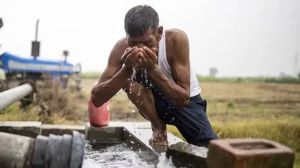Stay updated with the latest - Click here to follow us on Instagram
To ‘promote’ language, CBSE orders schools to observe ‘Sanskrit week’
Told to organise events from August 26 to September 1; city teachers slam the move as another ‘attempt’ to impose the language on students.
 A circular issued to CBSE school principals has directed schools to observe Sanskrit week from August 26 to September 1.
A circular issued to CBSE school principals has directed schools to observe Sanskrit week from August 26 to September 1.The Central Board of Secondary Education (CBSE) Tuesday has asked all its affiliated schools to celebrate ‘Sanskrit week’, to promote and popularise the language among students and youngsters.
A circular issued to CBSE school principals has directed schools to observe Sanskrit week from August 26 to September 1. In response to the circular, some school teachers in the city have slammed the move by calling it another “attempt” to impose the language on students.
The circular dated August 25, reads: “Sanskrit is one of the ancient languages of India and it is important to familiarise oneself with Sanskrit if one has to understand the growth of Indian civilisation and culture. The objective of celebrating “Sanskrit Week” may be to provide voluntary opportunity to students to share their knowledge of Sanskrit and learn it from each other. The celebration of this week would increase awareness about the close relationship among Sanskrit and various other languages and cultural heritage of India. It may also stimulate linguistic creativity among students. The schools may organise many activities throughout the week, which may be celebrated from August 26, 2015 to September 1.”
However, teachers of some of the schools have said that the circular was issued very late and this would mean that the language is being imposed upon the students.
“Even though the circular is not compulsory, schools have forced the teachers to organise events. We have been asked to look for an eminent personality from Sanskrit literature. It is not that easy.”
Last year, Union Human Resource Development Minister Smriti Irani had suggested making Sanskrit a compulsory language in CBSE schools, especially in Kendriya Vidyalaya, however, after facing strong criticism from across the country the move was turned down.
Another teacher from a CBSE school in Andheri said, “The central government’s plan to make Sanskrit compulsory in schools never worked. Hence they have come up with such ways to promote it.”
The board has also listed suggestion for the events to be organised during the week in the circular. It states: “The schools may hold short-speech and essay competitions for students from classes IX to XII, and the winners of the competition can take part in a national-level competition. Individual students may record a laghubashanam (a short speech) of two minutes, on a topic of interest in Sanskrit.”
“The essay should relate a topic for promotion of Sanskrit or modern Indian languages, Indian art and culture, interlinking Sanskrit with other languages and allied topics. Besides schools can organise Sanskrit shlokas antyakshari or recitation competition for students and may invite eminent Sanskrit scholars as jury and to interact with students,” said DT Sudarshan Rao, Joint Secretary and IC (Academics and trainings)
CBSE has also asked schools to encourage students from all classes to compose short Sanskrit poems on different themes and send the best poems to the Board. Besides, teachers have been directed to “establish links of Sanskrit with modern Indian languages. It has also directed schools to organise ‘Yuva Sansad’ or Youth Parliaments.
25 per cent clear SSC supplementary exams
Of the 1,39,329 students who had appeared for the SSC supplementary exams that took place in July-August 2015, 35,346 students have passed, which is a pass percentage of 25.37 across the state. This is the first time that the Maharashtra State Board of Secondary and Higher Secondary Education (MSBSHSE) conducted the supplementary exams in July instead of October.
In the Mumbai division, of the 32,518 students that gave the exams, 5,800 passed making a pass percentage of 17.84. The decision to hold the exam in July was taken by education minister Vinod Tawde to ensure that students who clear the examination will be eligible to apply for admissions in junior colleges this year and do not lose out on an academic year. The highest number of registration was in Mumbai division with 32,518 students, followed by Pune where 18,858 students appeared for the exam. In Mumbai, the highest number of registrations was from Thane region with 13,333 students appearing for the exam out of which 2,529 passed the exam.
dipti.singh@expressindia.com







